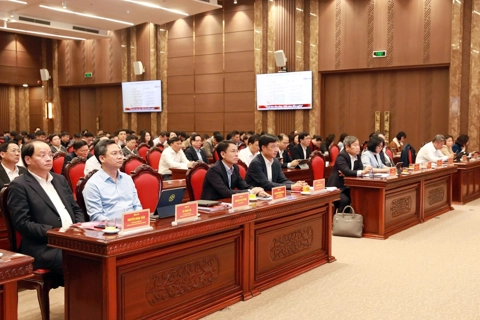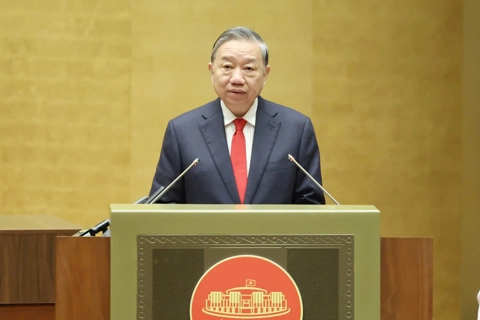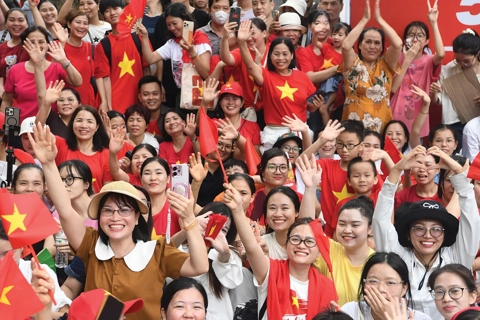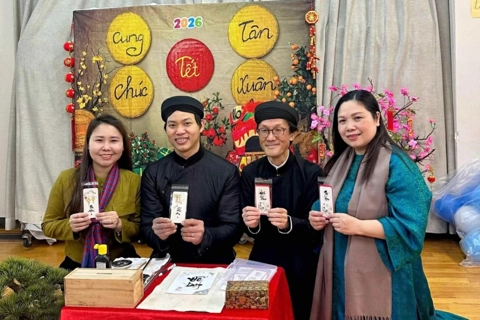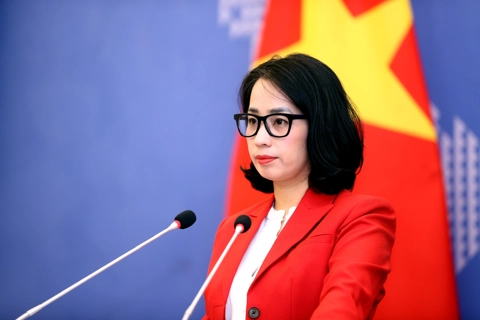President Ho Chi Minh - Vietnam’s first revolutionary journalist and his enduring legacy
President Ho Chi Minh’s vision endures in today’s Vietnamese press, where truth, clarity, and public service remain guiding principles, not just historical ideals, but living values.
THE HANOI TIMES — In the pantheon of revolutionary figures who shaped modern Vietnam, President Ho Chi Minh stands not only as a national liberator and statesman but also as the founder of Vietnamese revolutionary journalism.
As the nation celebrates the centenary of its press (June 21, 1925 - 2025), his legacy as Vietnam's first revolutionary journalist continues to reverberate through generations of reporters, editors, and thinkers.
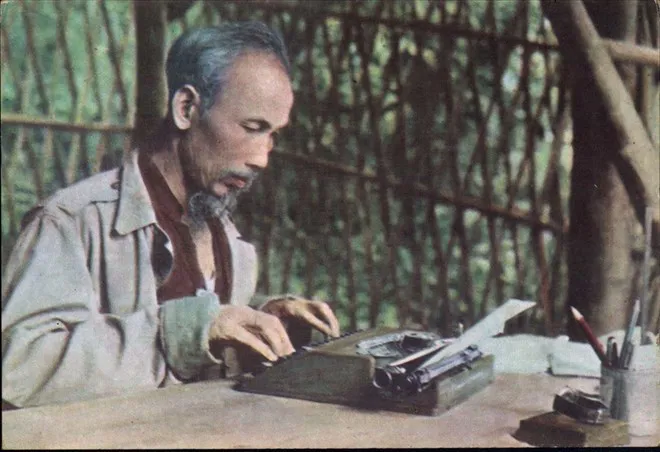
President Ho Chi Minh. Photo: Archive
From patriotic youth to revolutionary pen
In 1925, amid colonial oppression and rising nationalist fervor, Nguyen Ai Quoc (President Ho Chi Minh's alias) founded Thanh Nien, Vietnam's first revolutionary newspaper, in Guangzhou, China. The first issue, published on June 21, a date now celebrated as Vietnam's Revolutionary Journalism Day, marked a pivotal moment when journalism became a tool of liberation.
"Journalism is a means of revolution that serves the nation's cause," he later said, underscoring his belief in its power to awaken political consciousness, mobilize the masses, and shape a better future.
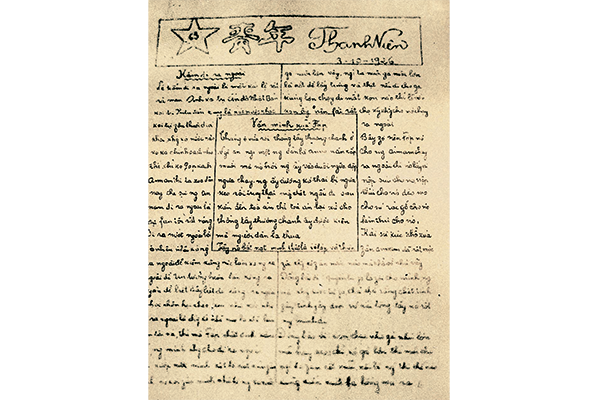
Thanh Nien newspaper, December 3, 1926 issue. Photo: dangcongsan.vn
Before known as "Uncle Ho," he was a prolific writer and editor. From passionate articles in French newspapers like L'Humanité to impassioned essays calling for Vietnamese independence, President Ho Chi Minh wielded his pen with determination. "Write plainly so that everyone: peasants, workers, scholars can understand and take action," he once advised. His style was simple yet penetrating, imbued with empathy, urgency, and revolutionary intent.
An anecdote from 1941 illustrates this: Returning to Vietnam after decades abroad, his first act in the jungles of Viet Bac was to launch Vietnam Doc Lap (Independent Vietnam), a mimeographed newspaper clandestinely distributed to villagers and resistance fighters. The publication didn't just inform, it inspired, boosting morale in times of war.
President Ho Chi Minh's journalistic ethics were inseparable from his revolutionary ideals. He believed that journalism should serve the people, tell the truth, and educate for social progress. He stressed clarity and accessibility: "Write short. Use everyday words. Write so that the peasants understand. This people-centered philosophy remains a guiding light for Vietnamese journalists.
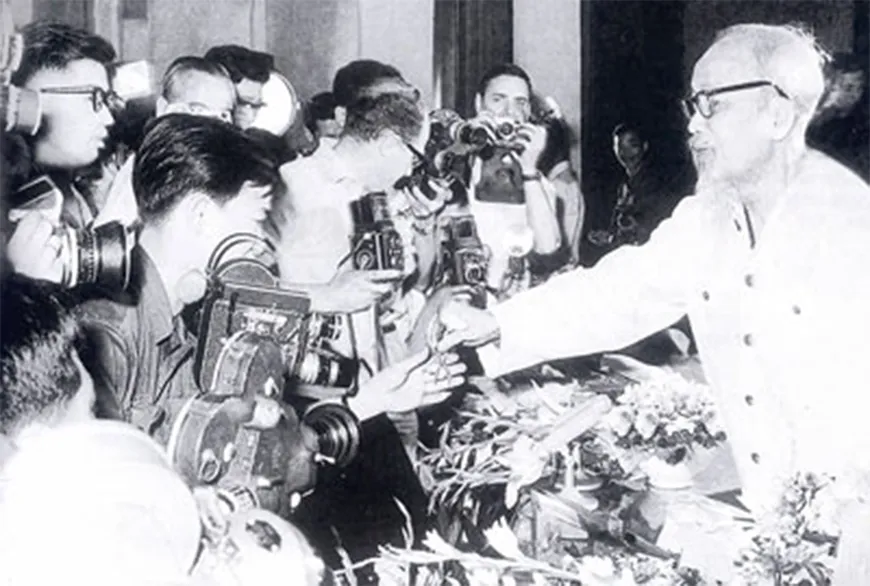
President Ho Chi Minh with journalists. Photo: hochiminh.vn
At the second Congress of the Vietnam Journalists Association in 1959, he declared: "Journalists are also soldiers. Their pens must be sharp and their hearts pure."
This enduring phrase reminds generations of Vietnamese reporters that truth, integrity, and responsibility are the essence of the profession.
A legacy that transcends time
The essence of President Ho Chi Minh's vision lives on in today's Vietnamese press. His emphasis on truth, clarity, and service to the people is not just a historical guideline, but a living principle embedded in the journalistic culture.
As digital media expands and misinformation threatens trust in news worldwide, President Ho Chi Minh's call for ethical, responsible journalism is more relevant than ever.
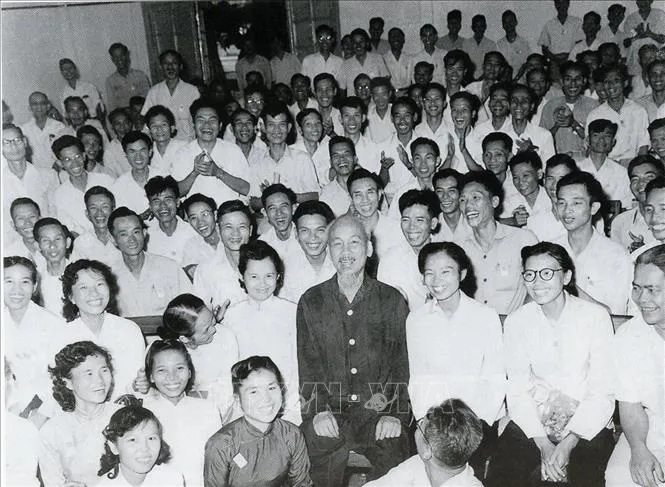
President Ho Chi Minh with delegates attending the 3rd Congress of Vietnamese Journalists (September 8, 1962). Photo: VNA archives.
In today's Vietnam, newspapers continue to carry on his legacy, balancing the delivery of news with national service. Journalists are trained to write in clear, accessible language that speaks to different members of social strata: intellectuals, peasants, workers, and students. His teachings, once whispered through jungle war bases, now echo through university lecture halls and editorial guidelines.
Moreover, President Ho Chi Minh's ethical foundations are deeply embedded in journalism training today. Institutions such as the Academy of Journalism and Communication in Hanoi uphold the values he championed: social responsibility, truthfulness, and moral integrity. In an age of popular fake news and clickbait, the Vietnamese press remains committed to accuracy and public trust, proving that the president's teachings are far from relics; they are roadmaps.
He authored over 2,000 articles and founded several newspapers, Cuu Quoc (National Salvation), Co Giai Phong (Flag of Liberation), Tap chi Cong san (Communist Review), each with a strategic purpose: to inform, uplift, and unite the Vietnamese people. They weren't just publications; they were catalysts of national consciousness.
Today, as the world navigates the complexities of AI-driven media and algorithmic news delivery, President Ho Chi Minh's call for journalism with a soul, truthful, human-centered, and morally grounded, feels timeless.
As Vietnam celebrates a century of revolutionary journalism, President Ho Chi Minh's spirit endures in the stories and the way they convey with integrity, clarity, and purpose. His image, pen in hand, remains iconic, not just as a memory, but as a living reminder of journalism's power to transform society.
In his own words: "A journalist must be both a patriot and a revolutionary, someone who dares to speak the truth, loves the people, and is devoted to the cause."
One hundred years later, Vietnam's press continues to walk the path he first paved with ink, courage, and hope.





